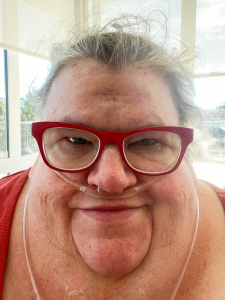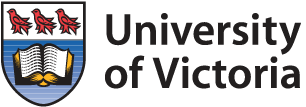Tina has a special role at the IMP: she teaches first-year medical students to view the healthcare system from a patient’s perspective.
 Tina is part of the First Patient Program, which pairs first-year medical students with community volunteers diagnosed with chronic medical conditions. Along with sharing her medical history with students to teach them more about her condition, Klippel-Feil syndrome (KFS), Tina shares more personal details like how she experiences KFS on a day-to-day basis and how it affects her social, mental, and emotional well-being. She also allows the students to accompany her to multiple medical appointments to better understand her experiences with the healthcare system.
Tina is part of the First Patient Program, which pairs first-year medical students with community volunteers diagnosed with chronic medical conditions. Along with sharing her medical history with students to teach them more about her condition, Klippel-Feil syndrome (KFS), Tina shares more personal details like how she experiences KFS on a day-to-day basis and how it affects her social, mental, and emotional well-being. She also allows the students to accompany her to multiple medical appointments to better understand her experiences with the healthcare system.
“We are so grateful to First Patient volunteers who share their personal healthcare journey. People with chronic conditions have unique healthcare needs, and their experiences and insights are invaluable for training effective, conscientious doctors,” says Sammie Gough, Patient Program Coordinator. “With volunteers meeting their students multiple times over an eleven-month period, this long-term relationship helps students to learn about the experience of illness through the patient’s eyes and the importance of continuity of care in medicine.”
We sat down with Tina to ask her about herself, her time in the First Patient Program, and the lessons of honesty, perseverance, communication, and keeping an open mind she imparts to her students.
Hi, Tina! Could you briefly introduce yourself?
I’m funny, but I am honest and fair… Well, I’m not necessarily fair, but I definitely believe in equity. I’ve been told I’m very unusual. I give without the concept of debt or score keeping. I grew up in Denmark. If you have too many potatoes, you share with your cousin or neighbour; you don’t put them in your cellar and keep them forever. A day will come when you don’t have any and you will be so grateful that someone feels the care and love to share their potatoes with you. We don’t all realize how we impact one another because we don’t always see it all the time. I want to see I am making a difference and be intentional about it.
How long have you been a volunteer with the First Patient Program?
I think four years. It’s hard to tell – there’s COVID in the middle there… Yes, I believe there’s been five sets of students I’ve connected with.
If you would like, could you tell us a little about your chronic condition and how it affects your life?
I have KFS. I was born with it. I was diagnosed with it when I was four and a half months old. It’s musculoskeletal and it also affects other organs. Over the last 20 years they are coming to understand how complex it [KFS] is. In my case, it affects eyesight. I have no depth perception. My eyes focus but don’t layer. I have learned depth perception. I have never been able to move my arms above my head. I have limited range with my arms. I also have scoliosis and spina bifida. For many years, I was fine. I was active; I was a mostly typical kid. As an adult, things have deteriorated. About 20 years ago, I was put on oxygen – most likely related to KFS. I put on weight after taking a risk to have a child. So now it affects me more as I age. I have a lot more problems with the movement of my neck as I really don’t have one. So, there are challenges around the house; I can’t do housework. Since I had my fall and broke my legs, I don’t do a lot of walking. I can walk, stand, but I don’t do a lot of walking. There is a lot going on: the KFS, lungs, legs. I also have arthritis and cancer.
What originally inspired you to start volunteering?
Going into it, I wasn’t completely clear on what the program was about. I knew it had something to do with medical students; I was told it was part of the training program. I’ve realized that the motivation for me was that the doctor I had wasn’t meeting my needs. I had come across lots of doctors whose ability to deal with patients who are outside the box wasn’t great. I thought if I could have an opportunity to help open the mind of medical students to see things from a different perspective so they might end up being more aware that there isn’t just one size fits all, then I wanted to be a part of it. I saw that students would have an opportunity to hear from someone who doesn’t fit into the box.
What motivates you to continue working with medical students?
Some of the best situations I’ve experienced in the medical realm have been when the doctor, nurse, or tech has taken a moment and said, “I don’t know everything. I am gonna take a step back and ask the person that knows all about their body: the patient.” By appearance, I look like I can’t stand for two minutes, but I can. Without communicating with me and asking me if I can, then I may miss out on a test because you judged what my abilities are without asking. By being open to asking what we can do together to make it happen, we’ve been able to do tests I was told weren’t possible.
What unique perspectives and experiences are you able to share with medical students in the First Patient Program?
I am always quite open to questions students have. Often our discussions revolve around the accessibility of medical care and, like I was saying, the jump to judgment of what I am capable of and my experiences around that. The feedback I get from students on what they take away from it is the different perspective of realizing that how a person appears isn’t necessarily everything that is going on. They tell me that they also learn perseverance. Don’t give up! Everybody deserves your best, including you. Just because you aren’t that square peg in the square hole doesn’t mean there isn’t a way to make things work, but it takes perseverance. You can’t walk away without giving it a good try.
What do you enjoy about the program?
I like meeting people – people fascinate me. I am amazed at the different perspectives students have on choosing to pursue a medical career that requires such incredible commitment. I find it interesting to hear about the new ways things are being taught. And I feel like I’m contributing somehow. I can’t work. The one thing that is a constant in my life is my health. It’s the one thing I know a lot about, so teaching about it seems like the thing to do. I am one of 42,000 people who have my condition [KFS].
Do you have a particular volunteer memory you’d like to share?
I have found with every set of students I’ve had that they are so considerate, attentive, and genuine, with sincere gratitude for the program. And I feel honoured by that. I sometimes wish there was more I could do.
What advice would you give to anyone thinking of becoming First Patient?
Don’t hesitate to be honest. The students won’t learn anything if you aren’t honest. “Be the change you want to see in the world.” That’s my mantra in this. It’s my biggest motivator to do this. I want to see the medical community have a greater understanding of what disability is. Don’t underestimate people. I really just want students to be aware of how much they affect their patients and how they can do that in a positive way, especially if they are looking for cooperation.
The First Patient Program is always interested in receiving applications from new volunteers. For more information about this opportunity, visit the IMP website or contact Sammie Gough at patientprograms@uvic.ca.
